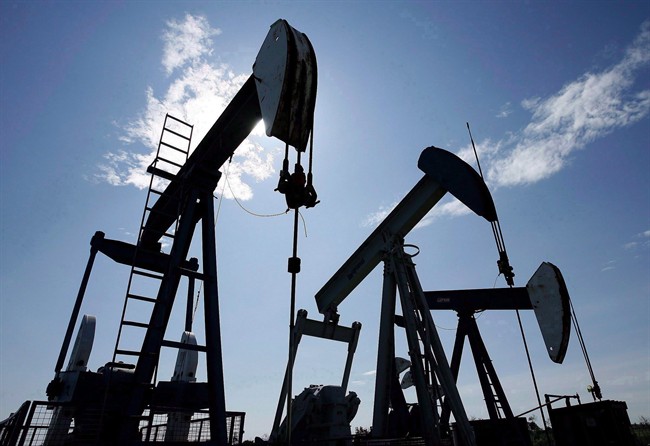Oil eased on Friday, on course for its largest weekly decline in a month after the Saudi energy minister watered down expectations that the world’s largest producers might agree next month to limit their output.

Brent crude futures were down 6 cents at $49.61 per barrel by 1339 GMT, having recovered from a session low at $49.12. West Texas Intermediate (WTI) crude nudged into positive territory, up 9 cents at $47.42 a barrel.
READ MORE: Falling oil prices drag down Canadian dollar to one-week low
Saudi Arabian Energy Minister Khalid Al-Falih told Reuters late on Thursday: “We don’t believe any significant intervention in the market is necessary other than to allow the forces of supply and demand to do the work for us.”
He said the “market is moving in the right direction” already.
WATCH: Alberta Finance Minister Joe Ceci said the oil price collapse and Fort McMurray wildfire have played a role in Alberta’s struggling economy.

Members of the Organization of the Petroleum Exporting Countries will meet on the sidelines of the International Energy Forum, which groups producers and consumers, in Algeria from Sept. 26-28.
The Saudi minister’s comments dampened expectations of a meaningful intervention into the market, which has been dogged by oversupply for more than two years.
The price of crude oil has fallen more than 3 percent so far this week, putting it on course for its largest one-week slide in a month.
“This week has clearly been a tug of war between fundamentals and this continued ‘verbal intervention’ that we’ve seen from various OPEC members,” Saxo Bank senior manager Ole Hansen said.
“All in all, it’s left the market relatively close to the $50 mark, which in my opinion is probably as much as OPEC can ask for at this point.”
Iran said on Friday that it would cooperate with other producers to stabilize oil markets, but added that it expected others to respect its individual rights.
Many observers interpreted that as Tehran saying it would continue to try to regain market share by raising output after the lifting of sanctions against it last January.
“I do not expect the OPEC meeting in September to agree any freeze or affect the oil market in any significant way. This is because it appears key OPEC members remain more concerned about market share,” said Oystein Berentsen, managing director for crude at oil trading firm Strong Petroleum in Singapore.
Analysts at Commerzbank also expressed doubt that any agreement might materialize next month.
“Capping production at this level would hardly reduce supply in any case, especially since other leading OPEC producers such as Iraq are producing at or near record levels,” the bank’s commodity team said in a note.
“And countries like Libya and Nigeria, which are producing significantly below their potential due to unscheduled outages, are hardly likely to sign up to any voluntary restriction of production.”

Comments